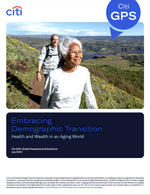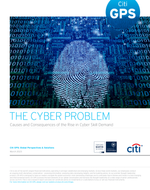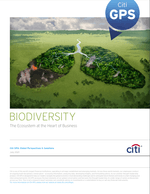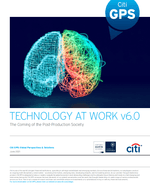Citi
View CITI GPS ReportThe Third Phase of Globalization
Trying to predict future trends and identify new technologies that will truly be disruptive can be both challenging and rewarding. It can also be incredibly humbling. Getting the trend right is only half the battle. The “you don’t know what you don’t know” is where things can get a little upside down.
Our very first Technology at Work Citi GPS report was based on a seminal report from Carl Benedikt Frey and Michael Osbourne that predicted 47% of U.S. jobs were susceptible to automation over the coming decades. The rationale was that non-routine manual tasks were increasingly able to be automated, and for the first time, low-skill and low-income jobs were at risk of automation. Lower automation risk was attributed to jobs that were intensive in social and creative skills. We did also note that a growing share of office and administration support jobs would soon be subject to automation as advances in big data continued.
We still think automation will continue to affect U.S. jobs and may impact even more sectors as recent developments in artificial intelligence take shape. But here is where our predictions missed something and “we didn’t know what we didn’t know”: The COVID-19 pandemic brought with it a rush of new technology that enabled workers to work from home while offices were closed. And while these advances were crucial to workers maintaining productivity from remote locations, it led to a realization: If a job could be done remotely, it could be done anywhere.
Corporates in industries like technology, which were historically clustered in large cities, can now move out of high-priced city centers to lower-cost secondary hubs. Initially, this should lead to a decline in economic disparities between regions. As skilled professionals follow their companies to lower-cost areas, service jobs are created in their new locations, and unskilled workers who have been battling the high cost of urban housing can follow.
But this shift may be short-lived. If a job can be done in a lower-cost region of the country, it can also be sent offshore. Similar to what happened in manufacturing decades ago, instead of moving a job to a secondary hub, corporates may decide to take advantage of the global wage arbitrage in professional jobs and move jobs outside the country.
What can be done to avoid the loss of jobs? Policymakers in advanced economies should focus on supporting science and education. Remote technology boosts collaboration at a distance, which is leading to increased innovation and breakthrough science. This, in turn, can lead to new job creation.
As we absorb this new information, we will keep trying to predict the future and identify the next disruptive innovation. As we keep learning from experience, hopefully we will get hit with fewer “don’t knows





